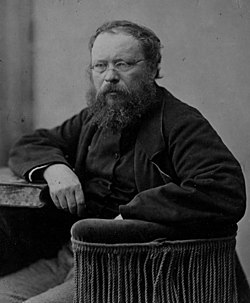Pierre-Joseph Proudhon
Pierre-Joseph Proudhon | |
|---|---|
 Ảnh chân dung Proudhon, chụp bởi nhiếp ảnh gia Nadar, 1862 | |
| Sinh | 15 tháng 1 năm 1809 Besançon, Pháp |
| Mất | 19 tháng 1 năm 1865 (56 tuổi) Passy, Paris, Pháp |
| Thời kỳ | Triết học thế kỷ 19 |
| Vùng | Triết học phương Tây |
| Trường phái | |
Đối tượng chính | |
Tư tưởng nổi bật |
|
Ảnh hưởng bởi | |
| Chữ ký | |
 | |
Pierre-Joseph Proudhon (tiếng Pháp: [pjɛʁ ʒɔzɛf pʁudɔ̃]; phiên âm tiếng Việt: Pruđông; 15 tháng 1 năm 1809 – 19 tháng 1 năm 1865) là một nhà xã hội chủ nghĩa,[4][5][6][7] nhà chính trị, nhà triết học, nhà kinh tế học và là người sáng lập trường phái triết học tương hỗ. Ông là người đầu tiên tuyên bố mình là một người vô trị (anarchiste),[8][9] Ông được công nhận rộng rãi là một trong những nhà lý thuyết vô trị có ảnh hưởng nhất và được nhiều người coi là "cha đẻ của chủ nghĩa vô trị".[10] Sau cách mạng năm 1848, Proudhon gia nhập nghị viện Pháp, rồi theo chủ nghĩa liên bang (federalist).[11] Proudhon mô tả sự tự do mà ông theo đuổi là "sự dung hòa giữa chủ nghĩa cộng sản và tài sản".[12] Một số người xếp tư tưởng tương hỗ này của ông vào dạng chủ nghĩa vô trị cá nhân,[13][14][15] song số khác lại coi nó nên được xếp vào dạng chủ nghĩa vô trị xã hội.[16][17][18]
Ông ca ngợi Napoléon Bonaparte tuy biết con người này là thiên tài của sự hủy diệt. Proudhon coi chiến tranh là quyền lực của sức mạnh, gần với quan điểm chân lý của đại bác của chính Napoléon[19].
Chú thích
[sửa | sửa mã nguồn]- ^ Zimmerman, Judith E. (1984). “Herzen, Proudhon and La Voix du Peuple: A Reconsideration”. Russian History. 11 (4): 422–450. doi:10.1163/18763316-i0000025.
- ^ Hoffman, Robert (1967). “Marx and Proudhon: A Reappraisal of Their Relationship”. The Historian. 29 (3): 409–430. doi:10.1111/j.1540-6563.1967.tb01785.x.
My real masters, those who have caused fertile ideas to spring up in my mind, are three in number: first, the Bible; next, Adam Smith; and last, Hegel.
- ^ Canto-Sperber, Monique (2004). “Proudhon, the First Liberal Socialist”. Trong Parrine, Mary Jane (biên tập). A Vast and Useful Art: The Gustave Gimon Collection on French Political Economy. Đại học Stanford. tr. 84–97.
- ^ Landauer, Carl; Landauer, Hilde Stein; Valkenier, Elizabeth Kridl (1979) [1959]. "The Three Anticapitalistic Movements". European Socialism: A History of Ideas and Movements from the Industrial Revolution to Hitler's Seizure of Power. University of California Press. tr. 59, 63. "In France, post-Utopian socialism begins with Peter Joseph Proudhon. [...] [Proudhon] was the most profound thinker among pre-Marxian socialists."
- ^ Eatwell, Roger; Wright, Anthony (1999). Contemporary Political Ideologies (biên tập ấn bản 2). London: Continuum. tr. 82. ISBN 9781855676053.
- ^ Newman, Michael (2005). Socialism: A Very Short Introduction. Oxford University Press. tr. 15. ISBN 9780192804310.
- ^ Docherty, James C.; Lamb, Peter, biên tập (2006). Historical Dictionary of Socialism. Historical Dictionaries of Religions, Philosophies, and Movements. 73 (biên tập ấn bản 2). Lanham, Maryland: The Scarecrow Press. tr. 284. ISBN 9780810855601. Xem thêm Lamb, Peter (2015). Historical Dictionary of Socialism (biên tập ấn bản 3). Lanham: Rowman & Littlefield. tr. 36, 57, 161, 263, 385. ISBN 9781442258273.
- ^ Merriman, John M. (2009). How a Bombing in Fin-de-Siècle Paris Ignited the Age of Modern Terror. New Haven: Yale University Press. tr. 42. ISBN 9780300217933.
- ^ Leier, Mark (2006). Bakunin: The Creative Passion. New York: Seven Stories Press. tr. 211. ISBN 9781583228944.
- ^ Guérin, Daniel (1989) [1970]. Anarchism: From Theory to Practice. New York: Monthly Review Press. ISBN 9780853451754.
- ^ Binkley, Robert C. (1963) [1935]. Realism and Nationalism 1852–1871. Read Books. p. 118.
- ^ Woodcock, George, ed. (1977). The Anarchist Reader. Hemel Hempstead: Harvester Press. tr. 68. ISBN 9780391007093. "This third form of society, the synthesis of communism and property, I call liberty."
- ^ George Edward Rines, ed. (1918). Encyclopedia Americana. New York: Americana Corporation. tr. 624. OCLC 7308909.
- ^ Faguet, Émile (1970). Politicians & Moralists of the Nineteenth Century. Freeport: Books for Libraries Press. tr. 147. ISBN 0836918282.
- ^ Hamilton, Peter (1995). Émile Durkheim. New York: Routledge. tr. 79. ISBN 0415110475.
- ^ Knowles, Rob (Winter 2000). "Political Economy from Below: Communitarian Anarchism as a Neglected Discourse in Histories of Economic Thought". History of Economics Review. 31 (1): 30–47. doi:10.1080/10370196.2000.11733332
- ^ Bowen, James; Purkis, Jonathan (2004). Changing Anarchism: Anarchist Theory and Practice in a Global Age. Manchester University Press. tr. 24. ISBN 9780719066948.
- ^ The Anarchist FAQ Collective; McKay, Ian, ed. (2008/2012). An Anarchist Faq. I/II. Oakland/Edinburgh: AK Press. ISBN 9781902593906. OCLC 182529204.
- ^ Chiến tranh và hòa bình, Lev Tolstoy, Cao Xuân Hạo, Nhữ Thành, Hoàng Thiếu Sơn, Trường Xuyên dịch, Nhà xuất bản Văn hóa-Thông tin, tập 1, trang 23
 GIẢM
22%
GIẢM
22%
![[Review Sách] 7 Định luật giảng dạy](https://down-bs-vn.img.susercontent.com/vn-11134207-7qukw-lidxs3ynamto6c.webp) GIẢM
12%
GIẢM
12%
 GIẢM
9%
GIẢM
9%
![[Review sách] Bay trên tổ cúc cu - Ken Kesey](https://down-tx-vn.img.susercontent.com/079e668073f965ecde883224be898386.webp) GIẢM
20%
GIẢM
20%
 GIẢM
49%
GIẢM
49%




